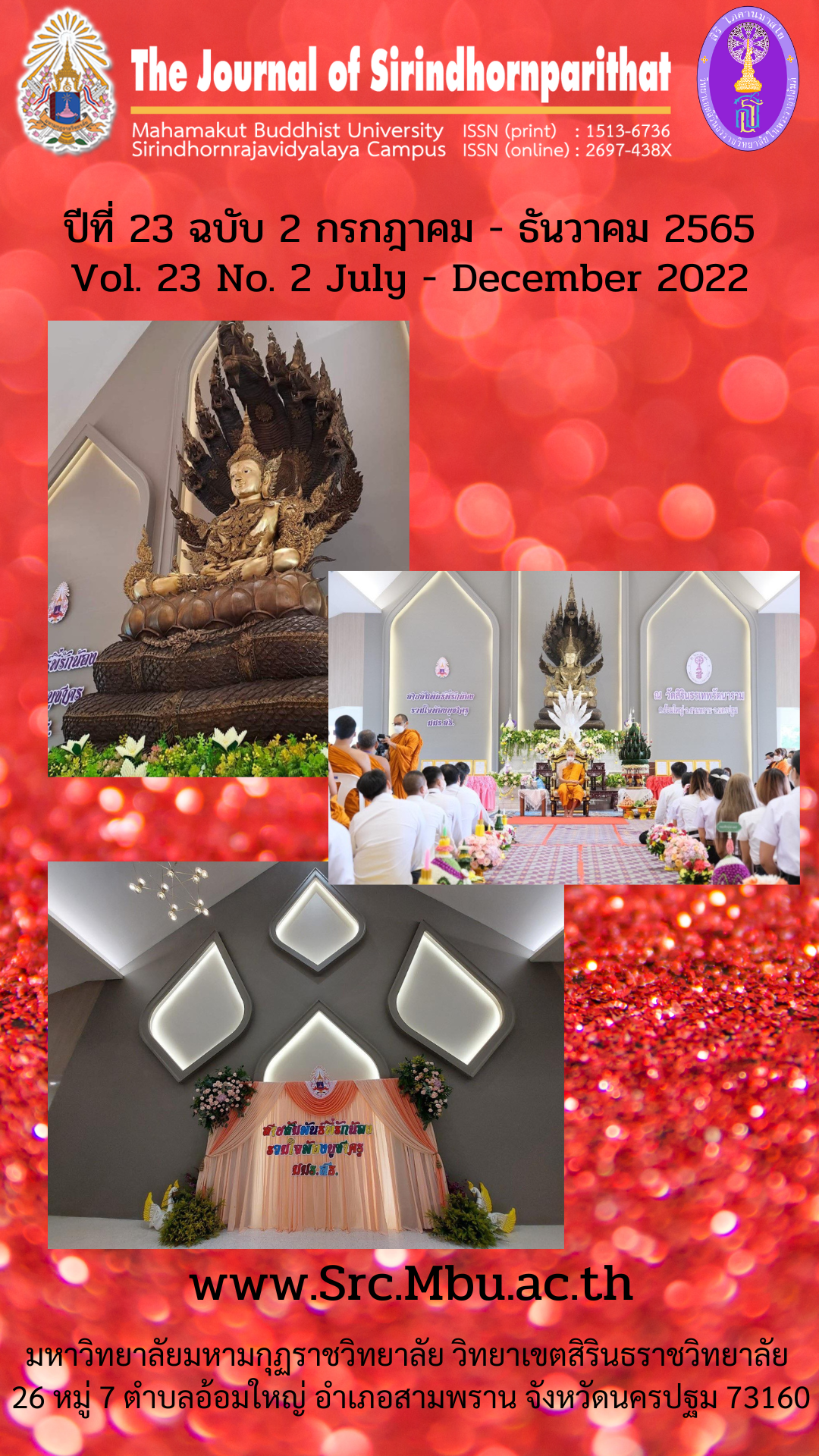Educational Leadership in the Coronavirus(COVID-19) Outbreak
ภาวะผู้นำทางการศึกษาในสถานการณ์แพร่ระบาดของไวรัสโคโรนา 2019 (COVID-19)
Keywords:
ภาวะผู้นำ, ภาวะผู้นำทางการศึกษา, การแพร่ระบาดของไวรัสโคโรนา 2019 (COVID-19)Abstract
บทความนี้เขียนขึ้นเพื่อชี้แนะความต้องการของลูกค้าทุกท่านในการเผยแพร่โปรแกรมแพร่ระบาดของไวรัสโคโรนา 2019 ที่ความได้เปรียบด้านความปลอดภัยของลูกค้าของเราเป็นหน้าที่ของผู้นำที่จะบริหารให้เป็นไปตามเป้าหมาย เป้าหมายคือผู้มีหน้าที่รับผิดชอบตามตำแหน่ง จำนวนมากในความต้องการที่จะขอให้ปฏิบัติตามหน้าที่โดยตรงในการแพร่ระบาดของไวรัสโคโรนา 2019 หมายความว่ามีความจำเป็นอย่างไรที่จะต้องแสดงภาวะผู้นำ ซึ่งผู้นำเหล่านี้อาจหมายถึงยุควิถีใหม่ซึ่งจะช่วยให้ได้รับความปลอดภัย อย่าโดนสถานการณ์ที่ไม่พึงประสงค์ซึ่งจะทำให้ต้องหลีกเลี่ยงภาวะที่ยุ่งยากในปัจจุบันโดยมองไปยังการ ปรับตัวของครูผู้สอนที่ต้องใช้การเรียนการสอน ภาวะผู้นำที่มีความจำเป็นจะต้องต้องมีการศึกษาที่มีความสามารถปกติซึ่งจะมีการบันทึกทรัพยากรใหม่ ซึ่งประกอบไปด้วยการกำหนดเป้าหมายที่จะพัฒนาบุคคลที่จะพัฒนาองค์กรช่วยให้องค์กร การฝึกสมาธิในการทำงานร่วมกันของผู้นำในกลุ่มนี้มีทั้งน้าวใจพฤติกรรมของผู้อื่น ปล่อยให้องค์กรประสบผลสำเร็จ โดยมีเงื่อนไขว่าผู้นำที่มีความเข้มแข็ง เพื่อบอกถึงความเป็นผู้นำของพวกเขาเองเพื่อที่จะได้รับผลลัพธ์ที่เกิดขึ้นกับสิ่งเหล่านี้
References
พรรัตน์ แสดงหาญ. (2553). “คนเก่งรักษ์องค์กร องค์กรรักษ์คนเก่ง” (Talent Management)” Human Resource Focus. 80 – 84.
พาสนา จุลรัตน์. การจัดการเรียนรู้สำหรับผู้เรียนในยุคThailand 4.0. Veridian E-Journal, Silpakorn University. 11(2): 2369- 2376.
วิชัย วงษ์ใหญ่. (2554). “การบริหารคนเก่ง”. สารานุกรมวิชาชีพครู เฉลิมพระเกียรติ พระบาทสมเด็จพระเจ้าอยู่หัว เนื่องในโอกาสพระราชพิธีมหามงคลเฉลิมพระชนมพรรษา 7 รอบ 5 ธันวาคม 2554. กรุงเทพฯ: สำนักงานเลขาธิการคุรุสภา.
สุวิมล มธุรส , (2564). การจัดการศึกษาในระบบออนไลน์ในยุค NEW NORMAL COVID-19. วารสารรัชต์ภาคย์. 15(40): 35-42.
สำนักงานเลขาธิการสภาการศึกษา กระทรวงศึกษาธิการ. มาตรฐานการศึกษาของชาติ พ.ศ. 2561.กรุงเทพฯ : บริษัท 21 เซ็นจูรี จำกัด.
Bass, B.M., & Avolio, B.J. (1993). Transformational leadership: A response to critiques. In M.M.
Day, C., & Gurr, D. (Eds.) (2014). Leading Schools Successfully: Stories from the field. London, UK: Routledge.
Day, C., & Leithwood, K. (Eds) (2007). Successful School Leadership in Times of Change. Dordrecht, Netherlands: Springer-Kluwer.
Drysdale, L. & Gurr, D. (2017). Leadership in Uncertain Times, International Studies in Educational Administration, 45(2): 131-159.
Gurr, D. (2015). A Model of Successful School Leadership from the International SuccessfulSchool Principalship Project. Societies. 5(1): 136-150.
Gurr, D & Drysdale, L. (2020). Leadership for challenging times, International Studies in Educational Administration. 48(1): 24-30.
Hallinger, P. (2018). Bringing context out of the shadow, Educational Management Administration & Leadership. 46(1): 5-24.
Leithwood, K., Harris, A., & Hopkins, D. (2020). Seven strong claims about successfulschool leadership revisited. School Leadership and Management. 40(1): 1-18.
Leithwood, K. A., & Riehl, C. (2003). What We Know about Successful School Leadership. Philadelphia, PA: Laboratory for Student Success, Temple University.
Leithwood, K., & Sun, J. (2012). The nature and effects of transformational school leadership:A meta-analytic review of unpublished research. Educational Administration Quarterly. 48(3): 387-423.
Ylimaki, R., & Jacobson, S. (Eds.) (2011). US and Cross-National Policies, Practices and Preparation: Implications for successful instructional leadership, organizational learning,and culturally responsive practices. Dordrecht, Netherlands: Springer-Kluwer.
Leithwood, K.A. & Riehl, C. (2003). What we know about successful school leadership. Philadelphia, PA: Laboratory for Student Success, Temple University.
Covey, S.R. (2004). The seven habits of highly effective people. New York : Simon and Schuster.
Loomba, N. P. (1978). Management, a quantitative perspective. New York: Macmillan.
Sakrungpongsakul, S., & Yuttanawiboonchai, J. (2016). Information Systems and Knowledge Management Technology. Bangkok: SE-EDUCATION Publishing House.
Wongyai, W., & Patphol, M. (2020). Learning Design for the New Normal. Bangkok: Graduate School, Srinakharinwirot University.

Downloads
Published
Issue
Section
License
Copyright (c) 2022 Mahamakut Buddhist University

This work is licensed under a Creative Commons Attribution-NonCommercial-NoDerivatives 4.0 International License.
บทความที่ได้รับการตีพิมพ์เป็นลิขสิทธิ์ของ มหาวิทยาลัยมหามกุฏราชวิทยาลัย วิทยาเขตสิรินธรราชวิทยาลัย
ข้อความที่ปรากฏในบทความแต่ละเรื่องในวารสารวิชาการเล่มนี้เป็นความคิดเห็นส่วนตัวของผู้เขียนแต่ละท่านไม่เกี่ยวข้องกับหาวิทยาลัยมหามกุฏราชวิทยาลัย วิทยาเขตสิรินธรราชวิทยาลัย และคณาจารย์ท่านอื่นๆในมหาวิทยาลัยฯ แต่อย่างใด ความรับผิดชอบองค์ประกอบทั้งหมดของบทความแต่ละเรื่องเป็นของผู้เขียนแต่ละท่าน หากมีความผิดพลาดใดๆ ผู้เขียนแต่ละท่านจะรับผิดชอบบทความของตนเองแต่ผู้เดียว



